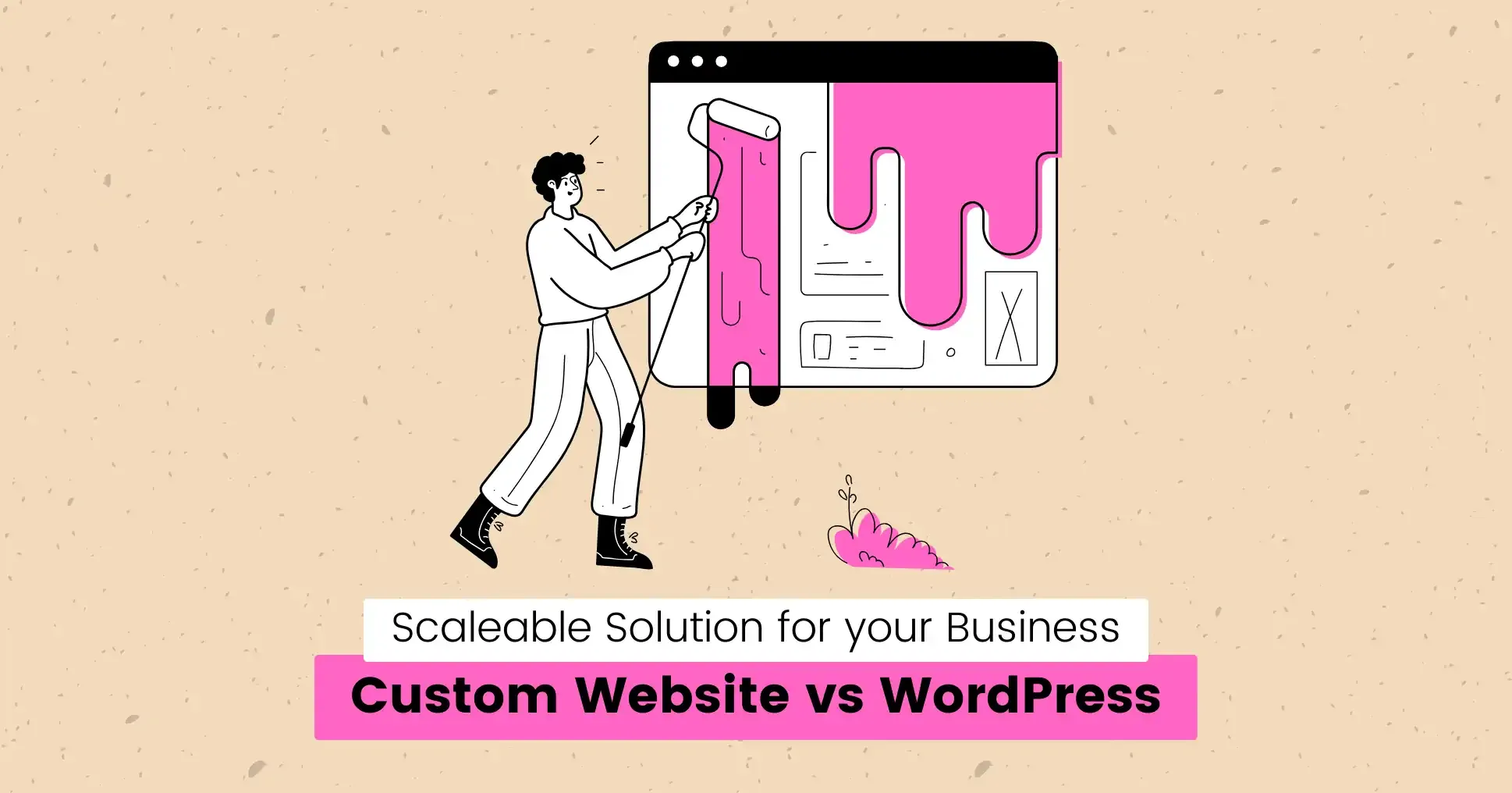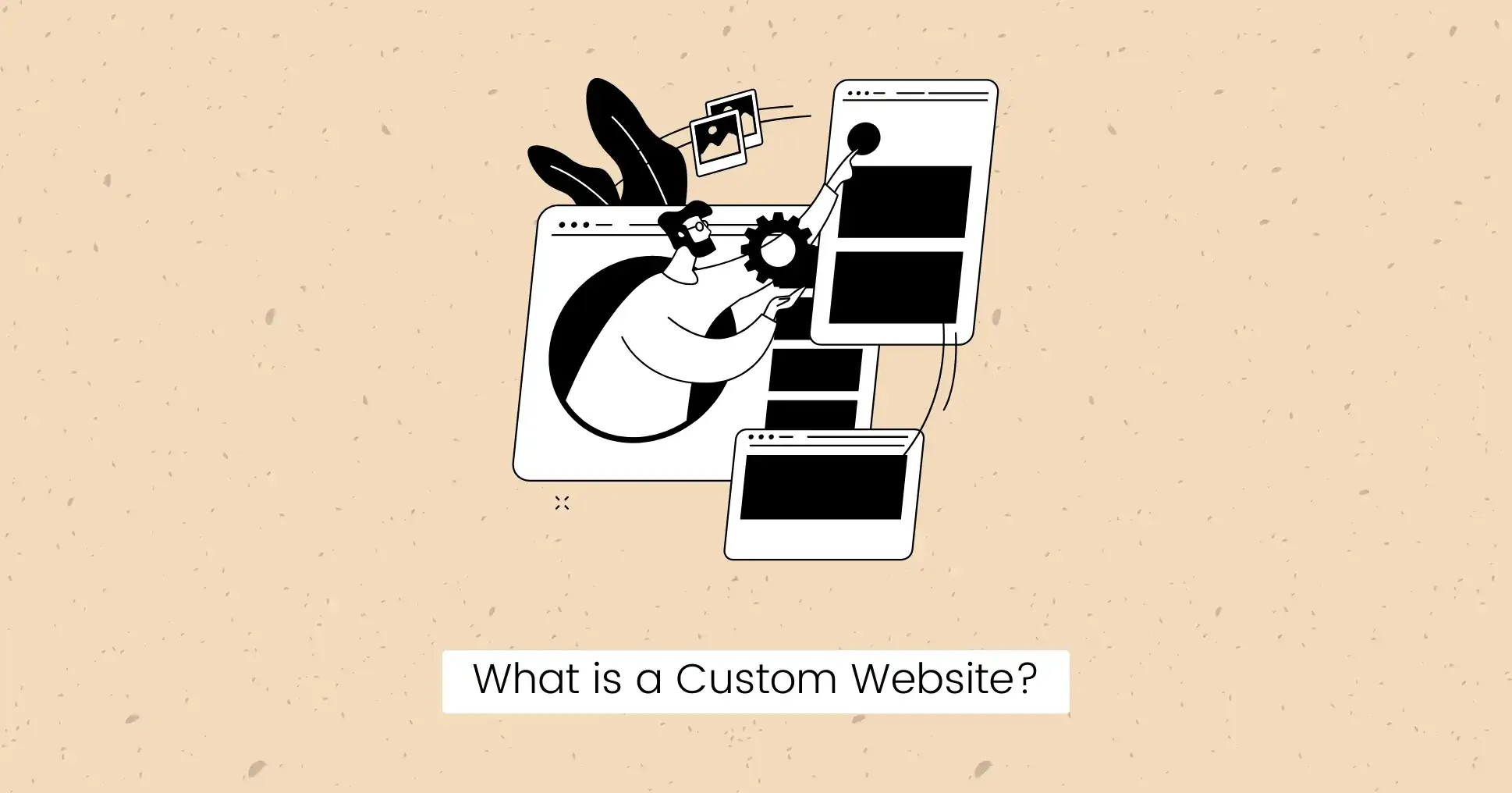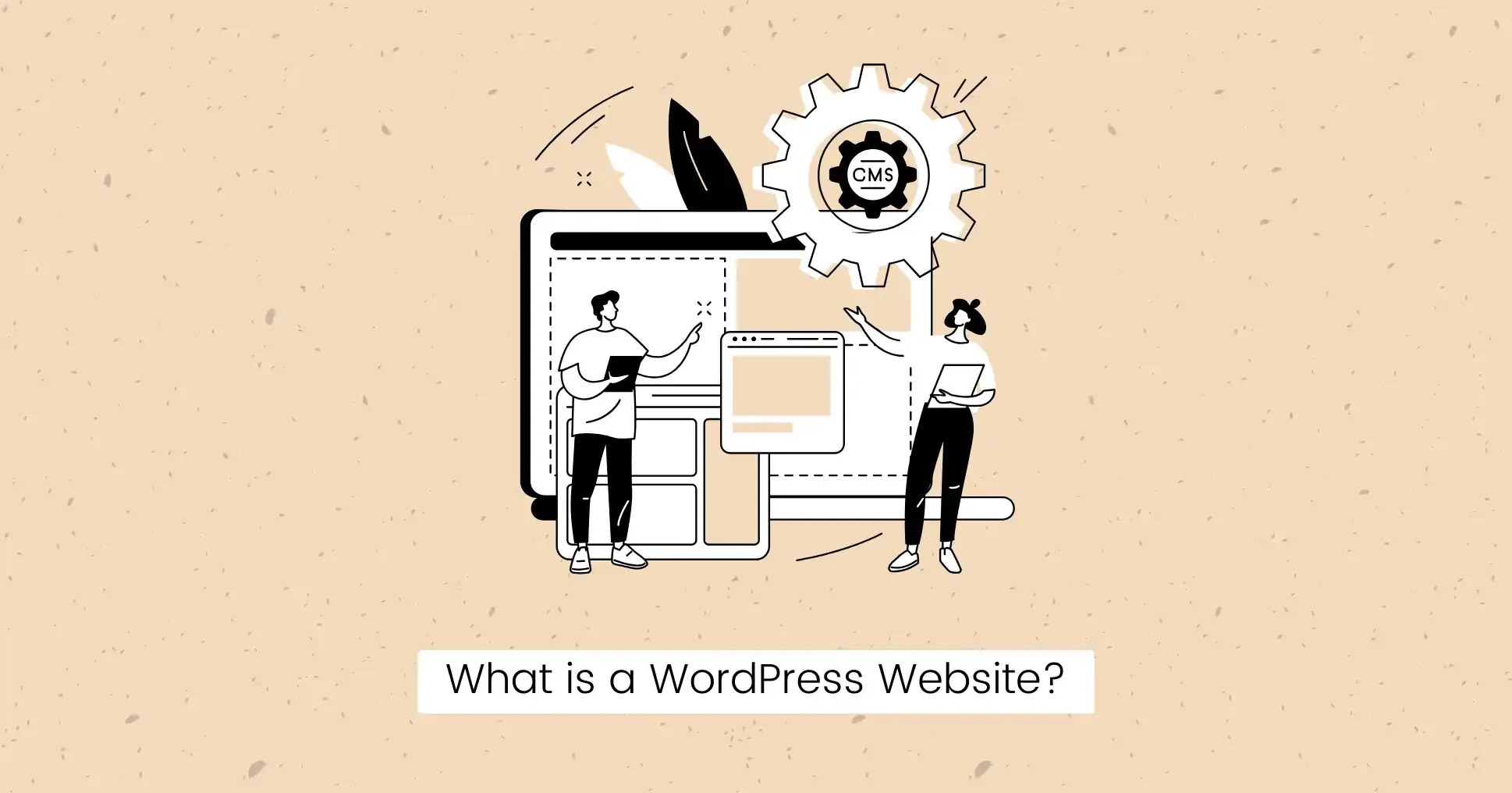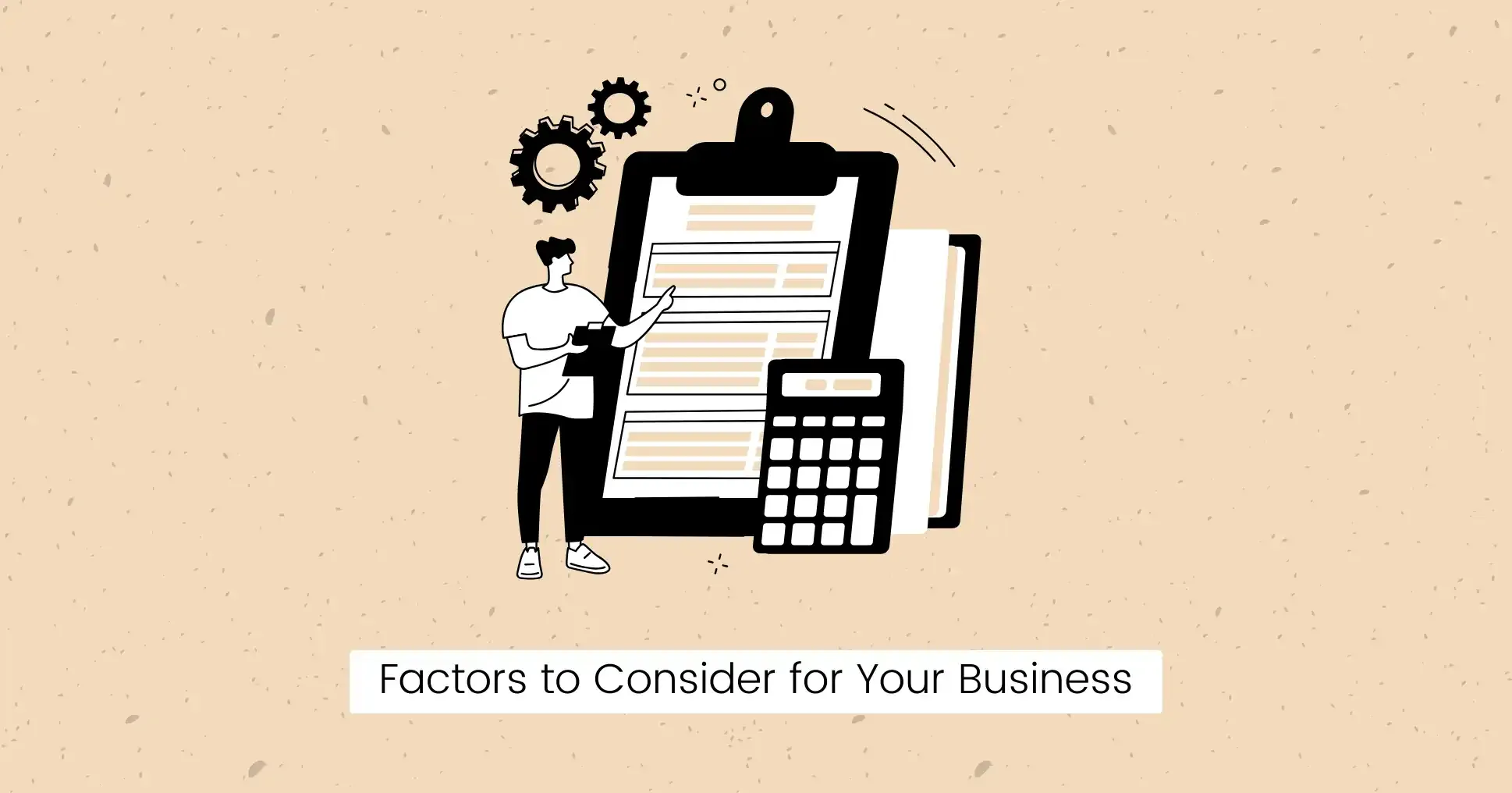Custom Website vs WordPress: Scaleable Solution for your Business (2024)

As you start building your business’s online presence, you’ll need to make a critical decision about whether to opt for a custom website or a WordPress site.
Both options have pros and cons, and it’s vital to understand which one best aligns with your business goals and needs.
In this guide, you will learn the key differences between custom websites and WordPress sites.
Let’s get started.
What is a Custom Website?

A custom website is a solution designed specifically for your business. It’s built from scratch to meet your unique needs and goals, offering high flexibility and customization.
Your business requires a unique online presence, and a custom website can be attractive.
To stand out in a competitive market, a custom website offers a unique design and functionality that aligns with your business goals.
With a custom website, you can create a customized user experience that differentiates you from competitors.
Pros of Custom Website:
- Unique design and functionality according to your business needs
- Enhanced security features to protect sensitive data
- Smooth integration with existing systems and tools
- Faster page loading speeds and improved user experience
- Better search engine optimization (SEO) capabilities
- Custom analytics and reporting to track performance
- Scalability to accommodate growing traffic and user base
Cons of Custom Website:
- Higher upfront development costs (average $5,000 to $20,000)
- Longer development time (average 1-3 months)
- Requires technical expertise for maintenance and updates
- Limited flexibility for design changes or updates
- Potential vendor lock-in due to custom code
- Higher costs for future updates and maintenance
- Learning curve for non-technical users
Tip: For the most affordable custom website, you can look into JetCoders services.
What is a WordPress Website?

Website builders and developers often create websites using WordPress, a popular content management system (CMS).
WordPress offers a range of templates, plugins, and customization options, making it a versatile and cost-effective solution.
Plus, WordPress allows you to easily update and manage your website’s content without requiring extensive coding knowledge. This makes it an attractive option for businesses wanting to maintain control over their online presence.
Despite its popularity, WordPress is not a one-size-fits-all solution for every business.
If you are considering using WordPress for your website, it is crucial to weigh the pros and cons to determine if it fits your needs.
Pros of WordPress Website:
- WordPress has a user-friendly interface, updating your website’s content easy.
- Customizable with thousands of themes and plugins, you can customize your website to fit your brand and needs.
- WordPress is free to use, and you can find affordable themes and plugins to get started.
- It has a massive community of developers and users, ensuring plenty of resources are available to help you troubleshoot issues.
- It has built-in SEO features or external plugins, optimizing your website for search engines easier.
Cons of WordPress Website:
- WordPress’s popularity makes it a target for hackers, and you’ll need to take extra measures to ensure your website’s security.
- It can be slow if not optimized properly, negatively impacting user experience and search engine rankings.
- If a plugin or theme becomes outdated or incompatible, it can cause issues with your website’s functionality.
- Limited Control Over Design While WordPress offers many customization options, design flexibility may still be limited compared to a custom website.
- Websites built on WordPress can be vulnerable to security risks if improperly maintained. This is because WordPress’s open-source nature makes it a target for hackers.
- For most of the rich features, you will have to buy additional plugins, which add recurring costs.
Do you need a website?
We create professional websites for small and medium-sized companies.

Factors to Consider for Your Business

It’s crucial to evaluate your business needs before deciding between a custom website and a WordPress website.
You need to consider various factors that will impact your website’s performance, scalability, and overall success.
- Business goals and objectives
- Budget and cost considerations
- Scalability and flexibility needs
The right choice will depend on your specific requirements and circumstances.
Business Goals and Objectives
Any business owner knows that having clear goals and objectives is vital to success.
For your website, you need to define what you want to achieve, whether it’s generating leads, increasing sales, or providing information to customers.
Budget and Cost Considerations
If you have a limited budget, a WordPress website might be a more affordable option, especially if you’re just starting out.
However, if you’re willing to invest in a custom website, you’ll have more control over the design and functionality.
Resources such as hosting, development, and maintenance costs should also be factored into your decision.
A custom website typically requires a larger upfront investment, while WordPress websites often involve ongoing subscription fees.
Scalability and Flexibility Needs
Many business owners do not realize that their website needs to adapt to changing circumstances, such as sudden traffic spikes or new product launches.
A custom website can offer more flexibility in terms of customization, while WordPress websites are often more scalable due to their modular design.
Plus, with a custom website, you’ll have more control over the architecture and infrastructure, allowing you to make changes as your business evolves.
On the other hand, WordPress websites can be easily extended with plugins and themes to accommodate growing demands. However, each rich functionality comes at an additional cost through plugins or themes.
Request a Custom Quote
Custom solutions specifically for you. Every business is unique. Let us create a quote that is perfectly custom to your needs. Contact us now to get a quote!

Final Words
To wrap up, you now clearly understand the pros and cons of custom websites and WordPress solutions for your business.
You’ve seen how each option can impact your online presence, scalability, and maintenance needs. By considering your unique requirements and goals, you can make a decision that sets your business up for success.
Whether you choose a custom website or WordPress, you’re one step closer to creating a strong online foundation that drives your business’s growth and revenue.
FAQs
Which option is more scalable for my business?
A custom website is generally more scalable than a WordPress website. Since a custom website is built from scratch, it can handle high traffic and large amounts of data, making it ideal for businesses anticipating rapid growth. WordPress websites, on the other hand, can become slow and cluttered as they grow, requiring frequent updates and maintenance.
Do I need technical expertise to maintain a custom or WordPress website?
With a custom website, you may require more technical expertise to maintain and update, as it’s a bespoke solution that requires specialized knowledge. On the other hand, WordPress websites are generally more user-friendly, with a vast community of developers and users who create plugins and themes that make it easier to manage and update. However, even with a WordPress website, some technical knowledge is still required, especially if you want to customize or optimize your site.